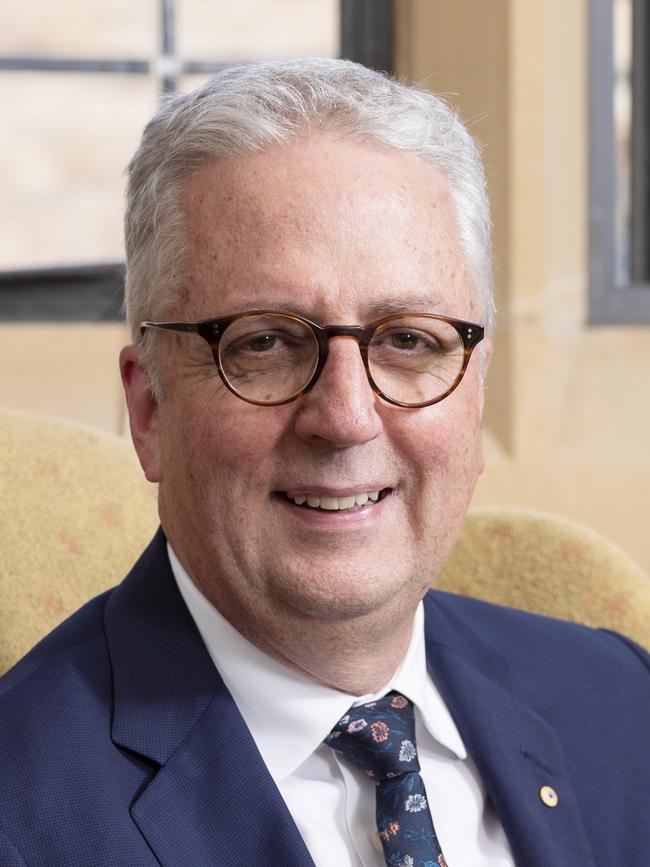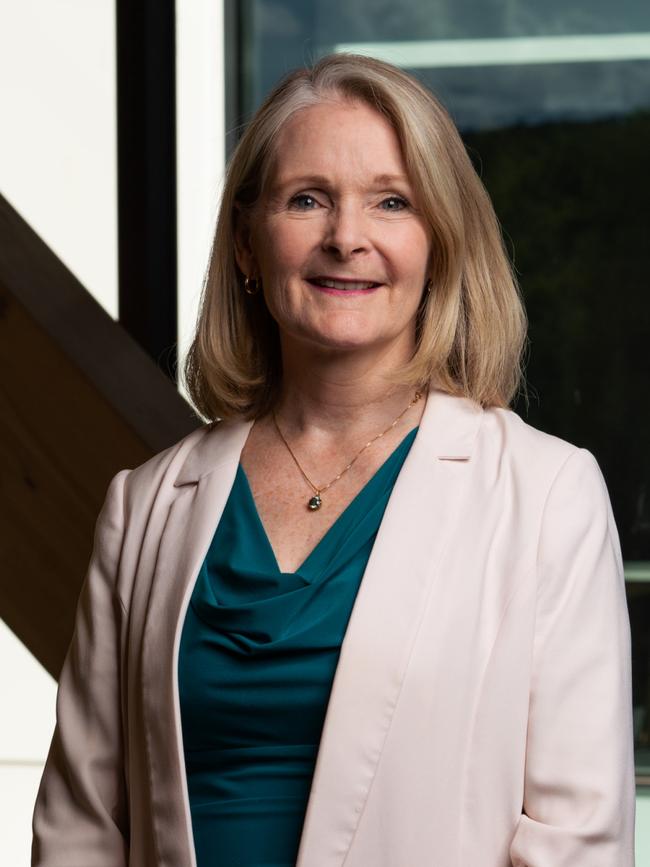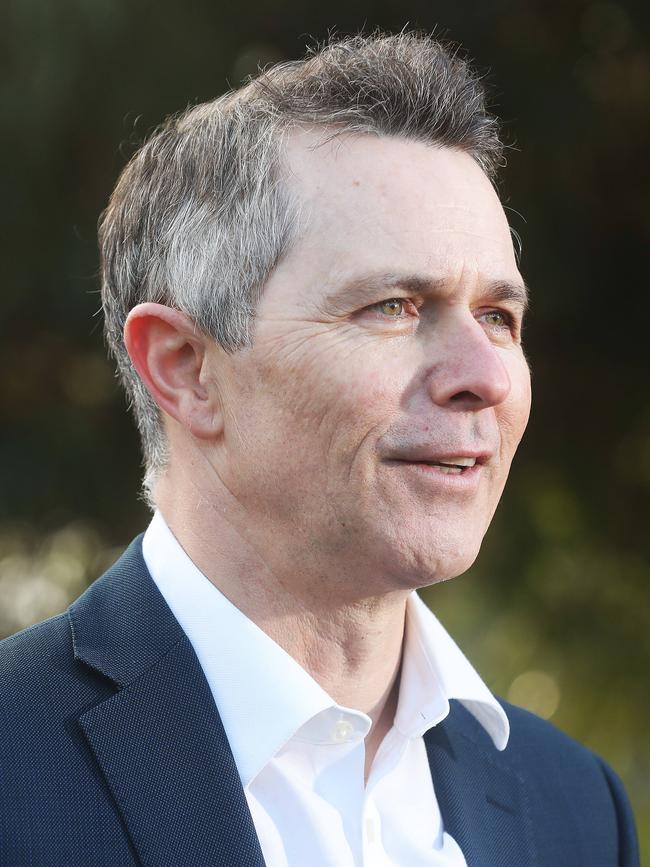University chiefs lecture schools on maths and science teaching
University chiefs have caned schools for failing to prepare ‘Zoomers’ for tertiary education, with domestic enrolments diving 10 per cent as Gen Z teens shun study for gap years, jobs and travel.

University chiefs have caned schools for failing to prepare “Zoomers” for tertiary education, with domestic enrolments diving 10 per cent as Gen Z teenagers shun study for gap years, jobs and travel.
As the Albanese government prepares to launch its landmark Universities Accord reforms, cash-strapped universities are demanding more financial assistance for students struggling to pay the rent during a cost of living crisis that is pushing poorer teenagers straight from school into the workforce.
University of Sydney vice-chancellor Mark Scott – a former teacher and director-general of the NSW Education Department – said schools were struggling with a shortage of maths and science teachers to prepare teenagers for university.
“Students at some schools are being discouraged from attempting that more demanding maths, perhaps not linked to the ability of the student, but more the availability of staff,’’ he said.
“There’s a chronic, entrenched shortage of mathematics teachers around the country now. I think the true shortage is often concealed because … there are plenty of PE (physical education) teachers who are being retrained in maths to just try and get a qualified teacher in front of the class.’’

Professor Scott said universities might need to offer more summer schools and intensive tutoring to get school leavers “up to speed’’ for university degrees.
“We are increasingly concerned, as we target students from low SES (socio-economic) backgrounds, that they are not getting the opportunity to study maths at a level that has been an important prerequisite for entry to some of our courses,’’ he said.
“There are a range of courses, from economics and business to science and engineering, that have required maths prerequisites, that we can see fewer and fewer students reaching because fewer students are doing maths at that advanced level.’’
Australian National University deputy vice-chancellor Grady Venville, a former high school teacher, said schools must ensure more students were taught maths and science at the highest level.
“We’ve got kids coming right through from primary school and falling behind, and when they get to high school … they’re often not encouraged or supported to do the higher level mathematics,’’ Professor Venville said.
“We don’t have enough highly qualified maths teaching staff (in schools), so that means it’s easier for the school to encourage the students to do an easier maths. What that does is narrow down the pipeline of students who can go into things like physics or engineering, pure mathematics and even our science subjects.’’

Professor Scott said his sandstone university – renowned for its medicine and engineering faculties – was considering removing the prerequisite for advanced high school mathematics for some degrees. “We wouldn’t be decreasing the standards for our programs, but providing more help for students … without watering down our courses,’’ he said.
“Perhaps more summer programs, more introductory programs, where the university takes on a greater responsibility to get students up to speed.’’
Professor Scott said the high cost of living was discouraging students from enrolling at university, or studying full-time.
He said the University of Sydney was lobbying the NSW government to grant it social housing development concessions to build more student accommodation.
“When I was a student here in the 1980s, some of the cheapest accommodation anywhere in the Greater Sydney area was surrounding the university,’’ he said.
“You could live cheaply in Glebe and Redfern and Newtown in a way that is often not possible now at all. We’re talking to our alumni about making more scholarships available that provide accommodation support.’’
Professor Venville said university students were taking longer to finish degrees as they juggle study with part-time work or travel. She said Gen-Zs, known as “Zoomers’’, seemed less mature than previous generations of university students and were keen to take a “gap year’’ after school.

In Brisbane, Griffith University vice-chancellor Carolyn Evans said schools were encouraging too many students to take vocational subjects, rather than the more difficult academic subjects.
“(This) means perhaps not as many people are as well prepared for university as they used to be,’’ Professor Evans said. “We’re quite concerned about the decline in the number of students taking high-level maths and some of the harder science subjects. There are a lot of applied subjects being done at school level, which are appropriate for some students. But they don’t necessarily get a really strong foundation to go on and do some of the things that we critically need in this country … like engineering, medicine and some of the health disciplines.”
Professor Scott noted that teenagers were dropping out of high school at the highest rate in 30 years. In public schools, 26.4 per cent of high school students had left before finishing Year 12 last year – up from 17 per cent in 2018, the Australian Bureau of Statistics revealed this week.
The latest federal Education Department data shows the number of students starting a degree fell 10.4 per cent last year to a nine-year low. First-year enrolments by domestic students fell 5.5 per cent between 2018 and 2022 – a trend that is sabotaging the federal government’s ambition to increase student numbers by one-third, to 1.2 million, over the next decade.
Federal Education Minister Jason Clare said skilling school-leavers for work was “not just the job of universities’’. “We need more people to finish school,’’ he said. “We need to fully fund all schools and tie that money to the reforms that will help kids who fall behind to catch up, keep up and finish school and then be able to go to TAFE or university.’’
Mr Clare said that “going to university opened up opportunities and makes you money’’.




To join the conversation, please log in. Don't have an account? Register
Join the conversation, you are commenting as Logout